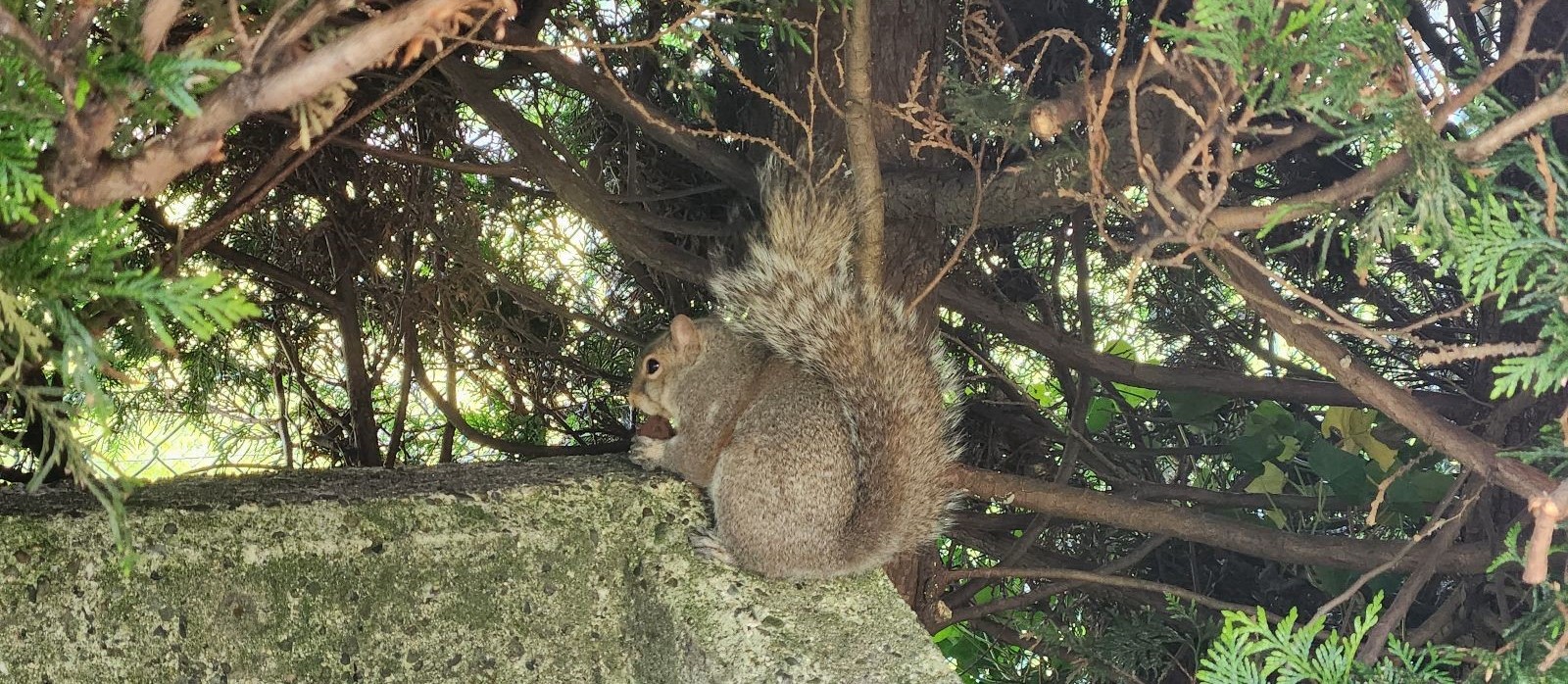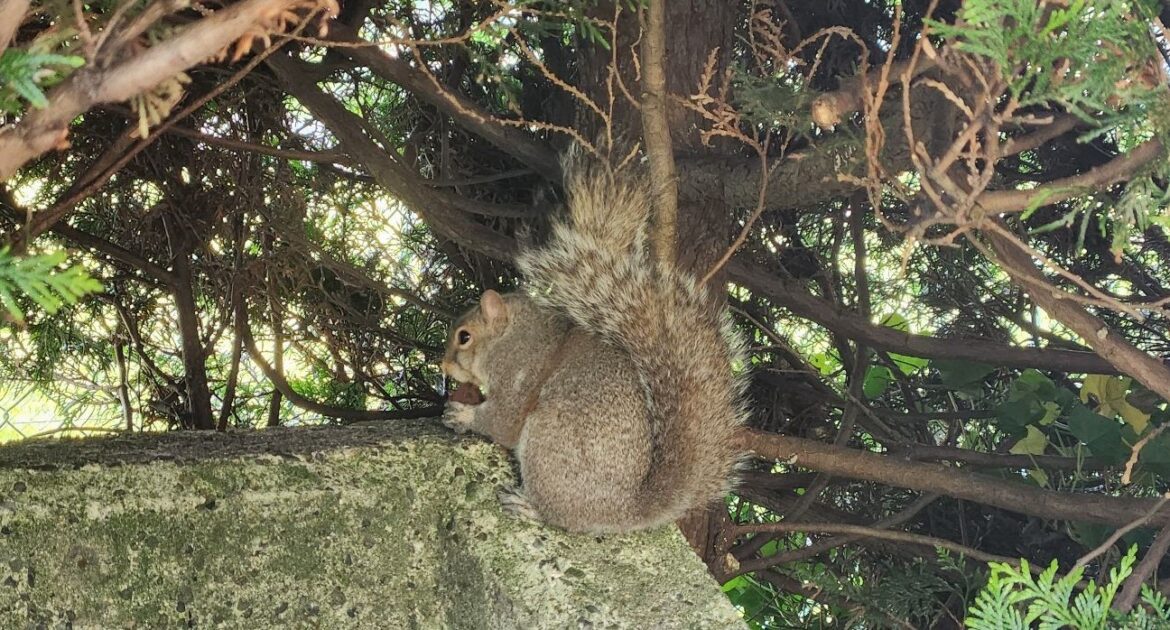Squirrels are everywhere in Minneapolis, from the trees in Minnehaha Park to the quiet streets of Linden Hills. But have you ever stopped to wonder about the impact these busy little animals have on the natural environment around us? It turns out, their contributions are more significant than many homeowners realize.
Understanding squirrel ecosystem benefits can help us see these creatures in a new light, and appreciate their importance in nature. From shaping tree growth to storing seeds and nuts, the squirrel role in environment is critical to maintaining balance in local ecosystems, including here in Minneapolis.
Squirrel Ecosystem Benefits
Squirrels play an incredible role as nature’s gardeners, helping shape biodiversity in forests and urban green spaces through their food-hoarding habits, known as caching. Here’s how they contribute:
1. Planting Trees and Shrubs
Squirrels collect seeds and nuts, bury them in shallow holes, and often forget about them. These forgotten seeds eventually grow into new trees and shrubs, shaping natural landscapes over time. The trees lining sidewalks in cities like Minneapolis or around the Chain of Lakes may owe their existence to squirrels!
2. Maintaining Genetic Diversity
By scattering seeds far and wide, squirrels help increase genetic diversity among plants. This improves the chances of trees thriving in different conditions, which is especially important for species such as oak and walnut trees that rely on animals for seed dispersal.
3. Supporting Fungal Growth
Squirrels indirectly promote plant health by burying seeds in soil where fungi thrive. These fungi form partnerships with plant roots, helping trees absorb nutrients more effectively. As a result, squirrels contribute to a healthy ecosystem through their simple caching behavior.
So, if you’re a gardener or tree enthusiast, you can thank squirrels for their instinct to save for a rainy day. They’re natural conservationists, playing a vital role in the cycle of growth and renewal in nature.
Importance of Squirrels in Nature
Beyond tree planting, squirrels have a broader impact on ecosystems. They’re vital for controlling the populations of certain plant and insect species. For instance, squirrels feed on fruits, nuts, and seeds, which helps prevent overpopulation of these items on the forest floor. If seeds and nuts accumulated unchecked, they could lead to unhealthy competition among plants vying for limited sunlight and nutrients.
- Squirrels consume pest insects like beetles and weevils along with their regular diet of acorns and grains.
- This helps balance insect populations in the ecosystem.
- It can indirectly benefit homeowners and gardeners by reducing pests that damage plants.
Squirrels are also an essential food source for numerous predators in the local food web. Hawks, foxes, bobcats, and owls all rely on squirrels as part of their diet. Without squirrels, many predator species could face challenges in sourcing enough food, leading to imbalances within the ecosystem.
Think of it this way—as adaptable as they are, squirrels are an integral connection between the plant life they nurture and the predators they sustain. Without this link, ecosystems like those around Lake Harriet or Theodore Wirth Regional Park could face disrupted ecological harmony.
Squirrel’s Role in The Environment
Squirrels play an essential role in urban ecosystems like Minneapolis, contributing to green spaces in ways that often go unnoticed. Here’s how these small creatures are making a big impact:
Soil Aeration through Caching
When squirrels bury their food caches, they unintentionally aerate the soil. This process improves root growth, helps rainwater penetrate the ground, and replenishes groundwater supplies. Whether in your backyard or along the Mississippi Riverfront, squirrels are quietly supporting the health of local ecosystems.
Enriching Soil with Nutrients
The nuts and seeds squirrels bury often decompose before germinating, releasing vital nutrients like nitrogen and potassium into the soil. This natural process enriches the soil, reducing the need for synthetic fertilizers and creating better conditions for plant growth.
Preventing Overgrowth
By consuming and removing excess seeds, squirrels help control overgrowth from competitive plants. This promotes a balanced ecosystem where smaller, native species can thrive, ensuring every plant gets enough sunlight, water, and space to grow.
Supporting Greener Landscapes
Squirrels may even contribute to unexpected green spaces. When they test burial sites in urban yards or along walkways, the result can be small patches of thriving vegetation. Though unintentional, these actions contribute to greener, healthier landscapes for everyone to enjoy.
Squirrels are more than just playful visitors to city parks—they’re hardworking partners in maintaining urban ecosystems and supporting biodiversity. Next time you see a squirrel scurrying around, remember the vital ecological work they’re doing behind the scenes!
Minneapolis and Squirrel Conservation
Here in Minneapolis, it’s impossible to ignore the city’s connection to nature, from the lush urban trails to the expansive parks scattered throughout. Squirrels are a fundamental part of this lively ecosystem and remain a visible symbol of urban wildlife thriving alongside human development.
That sense of coexistence is worth preserving. Protecting squirrels and their habitats is essential for ensuring they can continue to contribute positively to our environment. Communities across Minneapolis benefit from not only the beauty but also the ecological health that comes from the hardworking role of squirrels.
- Plant trees like oaks and pines to provide food and shelter for squirrels.
- Support squirrels’ role as seed-dispersing stewards by maintaining these trees.
- Avoid harmful pesticides to create a squirrel-friendly garden and protect the environment.
It’s equally important to be mindful of how we share urban spaces with wildlife. If there’s a squirrel in your attic or damaging your home, use humane wildlife removal services rather than harmful traps. Solutions like those our team at Skedaddle provides can humanely protect your home while continuing to preserve ecological balance.
Skedaddle’s Humane Squirrel Removal Services
At Skedaddle, we take pride in delivering humane and effective squirrel removal services that protect both your home and the local wildlife. Our approach is built on innovative, eco-friendly methods designed to safely remove squirrels without causing them harm. When you choose Skedaddle, our trained professionals will begin with a detailed inspection of your property to identify squirrel entry points. From there, we implement comprehensive solutions that not only prevent squirrels from re-entering but also ensure the structural integrity of your home is preserved.
Our work focuses on finding harmony between wildlife and urban living. With over 30 years of experience in delivering ethical and reliable wildlife control services, we are deeply committed to preserving ecological balance. This commitment ensures that our work not only safeguards homes but also fosters a respectful coexistence with wildlife.
When you partner with Skedaddle, you can trust that we will handle your squirrel issues with compassion and professionalism. Our expertise offers peace of mind, knowing that every step of the process is handled with care and respect for both your family and the animals involved. Choose Skedaddle for solutions that prioritize the well-being of all and deliver long-term results you can rely on.
See Squirrels Differently
Squirrels are far more than just busy tails darting through the trees—they are vital contributors to biodiversity and environmental health. Whether they’re burying seeds for new forests or balancing local plant life, squirrels are natural allies in maintaining Minneapolis’s thriving ecosystems, from Cedar Lake all the way to the peaceful streets of Nokomis.
Next time you’re sipping coffee by the Stone Arch Bridge, think about the small but mighty role squirrels play in building the world around us. If you’re curious about how to protect both your home and beloved neighborhood wildlife, reach out to us at Skedaddle. Together, we can create solutions that benefit both people and the environment.




